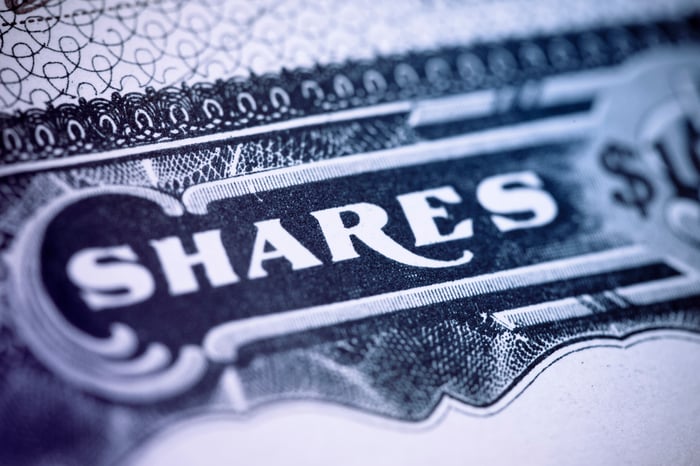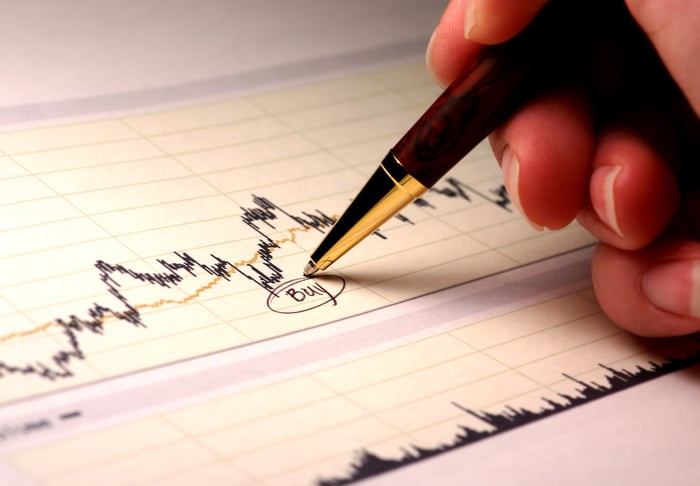In case you haven't noticed, the bulls are running wild on Wall Street. Following a challenging year in 2022, which saw all three major stock indexes plunge into respective bear markets, the ageless Dow Jones Industrial Average, benchmark S&P 500, and innovation-driven Nasdaq Composite have all launched to new all-time highs in 2024.
There isn't just one factor that can be pointed to as the fuel for Wall Street's epic rally. Rather, it's a confluence of factors that includes a strong U.S. economy, better-than-expected corporate earnings, the emergence of artificial intelligence (AI) as a next-big-thing trend, and a historically robust level of share repurchase activity.

Image source: Getty Images.
Although aggregate corporate share buybacks in 2023 fell from the record levels observed during the 2022 bear market, the $787.3 billion S&P 500 companies collectively spent on share repurchases on a trailing-12-month basis, as of Sept. 30, 2023, remains well above the historic average.
The reason public companies enact share repurchase programs is threefold:
- For companies with steady or growing net income, a steady reduction in the number of outstanding shares can increase earnings per share (EPS) over time. In other words, it can make a company appear more fundamentally attractive to investors.
- When a public company retires shares of its common stock, the ownership stakes of existing/long-term shareholders can increase over time. This encourages investors to have a long-term mindset.
- It's a way for a company's board of directors to demonstrate faith in a company's long-term growth strategy.
While more than 56% of S&P 500 companies repurchased at least $5 million worth of their own stock during the September-ended quarter, there are a few companies that are step above the rest when it comes to buybacks.
Since 2013, the following three widely owned companies have collectively repurchased $1.07 trillion worth of their own stock.
Apple: $651 billion in share repurchases since 2013
When it comes to share repurchases, it's fair to say that tech stock Apple (AAPL -0.35%) is in a class of its own. Since initiating a share buyback program in 2013, the company has bought back about $651 billion worth of its common stock.
To put this into context, there are only eight companies in the S&P 500, excluding Apple, with a market cap above $651 billion. Apple could have comfortably purchased 491 of the other 499 S&P 500 companies with the amount of money it's spent buying back its stock.
There are a couple of reasons Apple has an abundance of cash to repurchase its stock. To start with, it's a trusted brand with an exceptionally loyal following. A survey conducted by SellCell.com in March 2021 of more than 2,000 iPhone users found that nearly 92% had no intention of switching smartphone brands with their next purchase.
Innovation is the other big reason Apple has been nothing short of a cash cow. Domestically, Apple's iPhone has accounted for 50% or more of smartphone market share since becoming 5G-capable in 2020.
However, Apple's future rests with innovation beyond the physical realm. Specifically, CEO Tim Cook has been emphasizing a shift toward subscription services. A subscription-driven operating model should steadily lift the company's operating margin, help smooth out some of the revenue lumpiness associated with physical product upgrade cycles, and can further enhance the benefits of the Apple product and service ecosystem.
While reducing its outstanding share count by 41% since 2013 has provided a lift to Apple's EPS, investors should remain diligent about digging beneath the surface when analyzing the company's growth trends. For instance, even though Apple's adjusted EPS ticked higher by $0.02 per share in fiscal 2023 (ended in September), the company's net income fell by $2.8 billion to $97 billion for the year.
For the moment, Apple's buybacks are helping to partially mask a stalling of its growth engine.

Image source: Getty Images.
Alphabet: $240 billion in share repurchases since 2015
Another S&P 500 component that's turned on the proverbial jets in the buyback department in recent years is Alphabet (GOOGL 10.22%) (GOOG 9.96%), the parent of internet search engine Google, social media site YouTube, and autonomous driving company Waymo, among other ventures.
Since initiating a share repurchase program in 2015, Alphabet's stock buybacks have grown with each passing year. The $61.5 billion spent repurchasing its stock in 2023 increased its aggregate buybacks over roughly eight years to $240 billion. Alphabet has spent enough on buybacks that it could have purchased all but 28 companies within the S&P 500, not counting itself.
If you're wondering what's made Alphabet such a success for so long, look no further than its virtual monopoly, Google. Data from GlobalStats shows that Google has accounted for at least a 90% monthly share of global internet search dating back almost nine years. It's the obvious go-to for businesses wanting to target their message(s) to users. As a result, Google tends to enjoy premium ad-pricing power in most economic climates.
However, the lion's share of Alphabet's cash flow growth moving forward may well come from Google Cloud. As of the September-ended quarter, Google Cloud was the world's No. 3 cloud infrastructure service provider, with an estimated 10% share of enterprise cloud spending. More importantly, this segment generated a full-year profit in 2023 after many years of losses. Cloud services tend to produce considerably higher margins than advertising.
As Alphabet's outstanding share count continues to shrink, the company's sales and net income are climbing. This is a recipe for EPS growth to outpace sales growth for the foreseeable future.
Microsoft: $183 billion in share repurchases since 2013
The third juggernaut that's been putting the pedal to the medal in the buyback department for more than a decade is Microsoft (MSFT 1.82%). Though I've arbitrarily cut off the start date at 2013, Microsoft has been repurchasing its stock for even longer than Apple. Since 2013, it's collectively retired around $183 billion worth of its common stock.
Not including itself, Microsoft has spent more on buybacks since the beginning of 2013 than the market caps of all but 41 S&P 500 companies.
Microsoft's continued outperformance is a function of it seamlessly blending its legacy operations with a handful of high-growth initiatives. For example, it's no secret that the growth heyday for Windows and Office have long since passed. Nevertheless, Windows still holds a 72% share of desktop operating systems worldwide. This is an exceptionally high-margin segment that generates abundant cash flow, which allows Microsoft to aggressively invest in higher-growth initiatives.
With regard to "high-growth initiatives," I'm primarily talking about cloud services and AI. Cloud infrastructure service platform Azure is the world's No. 2 provider in terms of enterprise spending. Meanwhile, Microsoft has invested billions into OpenAI, the company behind popular chatbot ChatGPT, and recently unveiled its Maia AI chip to help power its own Azure data centers. The cloud and AI can help Microsoft sustain a double-digit sales growth rate.
Microsoft also has what might be the most pristine balance sheet on the planet. It's one of only two publicly traded companies to receive the highest possible credit rating (AAA) from Standard & Poor's. Microsoft closed out calendar year 2023 with $81 billion in cash, cash equivalents, and short-term investments, and it's generated nearly $103 billion in operating cash flow over the trailing-12-month period. This cash allows Microsoft to innovate, make acquisitions, buy back copious amounts of its own stock, and comfortably pay out the largest nominal-dollar dividend among publicly traded companies in the U.S.





